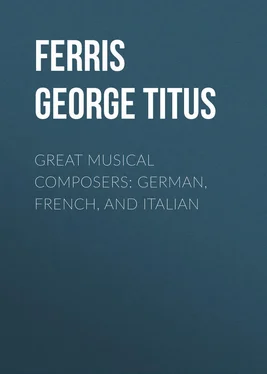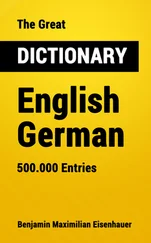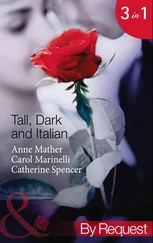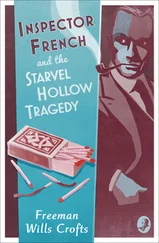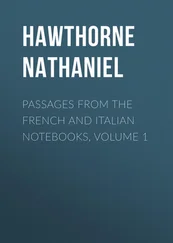George Ferris - Great Musical Composers - German, French, and Italian
Здесь есть возможность читать онлайн «George Ferris - Great Musical Composers - German, French, and Italian» — ознакомительный отрывок электронной книги совершенно бесплатно, а после прочтения отрывка купить полную версию. В некоторых случаях можно слушать аудио, скачать через торрент в формате fb2 и присутствует краткое содержание. Жанр: music_dancing, foreign_antique, foreign_prose, на английском языке. Описание произведения, (предисловие) а так же отзывы посетителей доступны на портале библиотеки ЛибКат.
- Название:Great Musical Composers: German, French, and Italian
- Автор:
- Жанр:
- Год:неизвестен
- ISBN:нет данных
- Рейтинг книги:3 / 5. Голосов: 1
-
Избранное:Добавить в избранное
- Отзывы:
-
Ваша оценка:
- 60
- 1
- 2
- 3
- 4
- 5
Great Musical Composers: German, French, and Italian: краткое содержание, описание и аннотация
Предлагаем к чтению аннотацию, описание, краткое содержание или предисловие (зависит от того, что написал сам автор книги «Great Musical Composers: German, French, and Italian»). Если вы не нашли необходимую информацию о книге — напишите в комментариях, мы постараемся отыскать её.
Great Musical Composers: German, French, and Italian — читать онлайн ознакомительный отрывок
Ниже представлен текст книги, разбитый по страницам. Система сохранения места последней прочитанной страницы, позволяет с удобством читать онлайн бесплатно книгу «Great Musical Composers: German, French, and Italian», без необходимости каждый раз заново искать на чём Вы остановились. Поставьте закладку, и сможете в любой момент перейти на страницу, на которой закончили чтение.
Интервал:
Закладка:
Germany – equally with Italy the land of music, but of harmonious in contra-distinction to melodic music, which belongs most properly to Italy, well named the land of song – was much later in developing her musical powers than Italy, but she cultivated them to grander and nobler proportions; for to Germany we owe the magnificent development of instrumental music, which culminates in the form of the sonata for the piano, and in that of the symphony for the orchestra, in the hands of such masters as Bach, Haydn, Mozart, Beethoven. In Germany the opera took root by means of a translation of Rinaccini’s “Dafne,” set to music by Henry Schütz in 1627, with Italian airs and German recitative. The first German opera or singspiel , “Adam und Eva,” by Johann Theil, was performed in 1678, but it became national through the works of Reinhard Keiser, whose opera “Basilino” was performed in 1693. “His style was purely German, less remarkable for its rhetorical perfection than that of Lulli, but exhibiting far greater variety of expression, and more earnest endeavour to attain that spirit of Dramatic Truth which alone can render such music worthy of its intended purpose.” He was worthily followed by Hasse, Grann, by Mozart’s “Le Nozze di Figaro,” “Die Zauberflöte,” “Don Giovanni,” and by Beethoven’s one opera “Fidelio.”
The growth of a national opera in Germany and France, competing with that of Italy, induced also the rise of party quarrels between the adherents of the several schools; and the history of music demonstrates the fact, often seen in the history of politics, that in such contentions the real point at issue – the excellence of the subject in question – is lost sight of in the fierce strife of opponents; the broader issues are obscured in the narrowing influences of mere partizanship, wherein each side on principle shuts its eyes equally to the merits of its adversary and to its own faults. Thus in the following sketches are recorded the quarrels between the adherents of Lulli and Rameau, Handel and Bonacini, Piccini and Gluck, Mozart and Salieri, Weber and Rossini, and in the present day between the advocates of Wagner’s “Music of the Future” and those of the “Music of the Past.” “The old order changes, giving place to new,” but only after a long protracted struggle, a struggle that will not be productive of good as long as the bitterness of partizanship exists, whose aim is wholly to annihilate its adversary, though thereby much that is good and fine be lost. This is not, however, the place to discuss the importance of such strife, nor the comparative advantages and disadvantages of its existence or non-existence – but it is as well to draw attention to it in order to point out that in the history of music the belligerents are usually blind to the important fact that, inasmuch as nations differ essentially in ways of thought and action, in character, temperament, and fundamental nature, so also must the various phases of art differ which are their mediums of expression.
The history of the art of music is divisible into two great epochs – the first dating from its birth about three centuries ago under the impelling influences of the Renaissance, to the end of the eighteenth century, when pseudo-classicism had given all it had to give; the second dating from the rise of Romanticism in the beginning of the nineteenth century to the present day. The revival of the “forgotten world of old romance – that world of wonder and mystery and spiritual beauty,” no longer crippled by lack of science, and fettered by asceticism, was to music, that youngest of the arts, a novel influence, which pushed it vigorously in a new direction, towards the more direct expression of the cravings of humanity – making it more human , more the fitting medium expression of this democratic age. The true romantic feeling has been described as “the ever present apprehension of the spiritual world, and of that struggle of the soul with earthly conditions.” This later period gave “new seeing to our eyes, which were once more opened to the mysteries and the wonder of the universe, and the romance of man’s destiny; it revived, in short, the romantic spirit enriched by the clarity and sanity that the renascence was able to lend.”
In the opera Gluck was one of the earliest masters who came under the influence of the new movement, and he anticipated Wagner in many of his reforms. He decreased the importance of the singer, and increased that of the orchestra, elaborated the recitative, and made the music to follow the rhythm of the words, and he also gave importance to the dramatic expression of the human emotions. In Germany Weber is styled the Father of the Romantic opera, as in France the most noteworthy figure is Berlioz, and the new method was further developed in the instrumental music by Schumann, and demonstrated by other musicians, dead and living, who, from the limited space of this volume, have not been specially noticed – Liszt, Franz, Thomas, Brahms, Rubenstein, Dvorák, Massinet, Bizet, Jensen, Grieg, and others. Gounod, is, of course, unmistakably under the same influence, and may be considered as the direct descendant of Gluck, and there is every reason to suppose that he is the last great composer of the grand opera of France, as Verdi is undeniably that of the Italian opera. The most remarkable figure of the movement, he who has carried it to its utmost limits, is Richard Wagner. At first he refused for his compositions the name of “Music of the Future,” and desired for them the more comprehensive term of “Work of Art of the Future.” It is impossible to predict to what extent his theories will be followed: it is not desirable that they should be blindly worked out by musicians of power inferior to his; but they are in the right direction, and may ultimately bring about a new art mode in music. The resources of art are endless, being, as the Abbé Lamennais tells us, to man what creation is to God; and music may safely be trusted to develop in such a way as to ever be the most fitting expression of the inarticulate cravings and aspirations of the human soul. Wagner has attempted to unite the three arts of Painting, Poetry, and Music: and of his work a competent judge has written – “The musical drama is undoubtedly the highest manifestation of which men are capable. All the most refined arts are called in to contribute to the idea. The author of a musical drama is no more a musician, or a poet, or a painter; he is the supreme artist , not fettered by the limits of one art, but able to step over the boundaries of all the different branches of æsthetic composition, and find the proper means for rendering his thought wherever he wants it. This was Wagner’s aim. His latter works, ‘Tristram and Isolde,’ the ‘Niebelungen Ring,’ and ‘Parsifal,’ are the actuation of the theory, or at least are works showing what is the way towards the aim.” Another eminent critic, Mr. Walter Pater, writing upon the fine arts, tells us that “ All art constantly aspires towards the condition of music … It is the art of music which most completely realises this artistic ideal, this perfect identification of form and matter. In its ideal consummate moments, the end is not distinct from the means, the form from the matter, the subject from the expression; they inhere in and completely saturate each other; and to it, therefore, to the condition of its perfect moments, all the arts may be supposed constantly to tend and aspire. Music, then, and not poetry, as is so often supposed, is the true type or measure of consummate art. Therefore, although each art has its incommunicable element, its untranslatable order of impressions, its unique mode of reaching the ‘imaginative reason,’ yet the arts may be represented as continually struggling after the law or principle of music, to a condition which music alone completely realises.”
Читать дальшеИнтервал:
Закладка:
Похожие книги на «Great Musical Composers: German, French, and Italian»
Представляем Вашему вниманию похожие книги на «Great Musical Composers: German, French, and Italian» списком для выбора. Мы отобрали схожую по названию и смыслу литературу в надежде предоставить читателям больше вариантов отыскать новые, интересные, ещё непрочитанные произведения.
Обсуждение, отзывы о книге «Great Musical Composers: German, French, and Italian» и просто собственные мнения читателей. Оставьте ваши комментарии, напишите, что Вы думаете о произведении, его смысле или главных героях. Укажите что конкретно понравилось, а что нет, и почему Вы так считаете.
